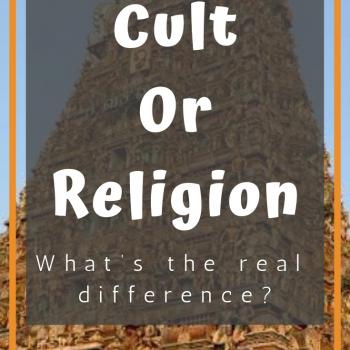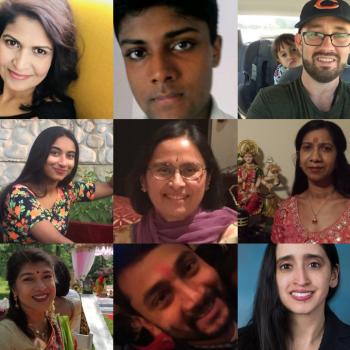You may have guessed from some of my previous posts that I am a liberal Hindu. I don’t like to draw strict lines of division, make battles of “us v.s. them” or dictate how anyone else should live. I err firmly on the side of letting others make their own mistakes and sorting it out with God and karma themselves.
As with any other hot-button issue, there are Hindus on both sides of the marriage equality question. When Hinduism Today interviewed various swamis about their opinion of same-sex marriage, they gave a wide range of opinions both positive and negative. Because Hinduism has no central authority, it is possible for teachers to debate and discuss without needing to claim that his way is The Hindu Way.
What is the purpose of marriage according to Hinduism?
It joins two people for four purposes:
- dharma —> duty, harmony, balance
- artha—> worldly possessions/wealth
- kama—> passion, lust, desire
- moksha—> spiritual liberation, enlightenment
{For the average Hindu, it is expected that he will fulfill different duties for different times in his life. Most are expected to be householders and work to build wealth and security for the family in the middle of their lives and then towards the end to become dedicated to spiritual development.}
I see nothing in those four purposes that would forbid same sex unions.
In my research of this subject I encountered some very interesting points:
- A liberal view is presented by Mathematician Shakuntala Devi, in her 1977 book, The World of Homosexuals, in which she interviewed Srinivasa Raghavachariar, head priest of the Srirangam temple. He said that same-sex lovers must have been cross-sex lovers in a former life. The sex may change but the soul retains its attachments, hence the love impels these souls towards one another.
- In 2002, Ruth Vanita (writer/reporter for GALVA – The Gay and Lesbian Vaishnava Association, Inc.) interviewed a Shaiva priest who performed the marriage of two women; having studied Hindu scriptures, he had concluded, “Marriage is a union of spirits, and the spirit is not male or female” (p. 147).
Both these quotes from: http://en.wikipedia.org/wiki/Religious_views_on_same-sex_marriage#Liberal_Hindus
For the most part I think Hinduism is stuck a bit in the past with this issue. The culture around Hinduism is used to a world where procreation is critical. That is not the world we live in today where over population is an enormous threat. (Then again those who argue that 1) procreation is super important and 2) “it’s unnatural” to be gay seem to not know that 1) society has always had members who did not have children and 2) gay behavior is found in many animal species. We might not understand the purpose for either of those things, but that doesn’t mean that nature doesn’t have a purpose for it).
If we have fewer children, there is no problem within Hinduism because those souls will have other births and eventually make their way to human embodiments but not all thought has caught up with this fact of modern life.
Gender identity within Hinduism can be quite fluid. Gods have female aspects, Arjuna the great warrior was turned into a woman for a year. The stories abound of people switching genders in mythology.
Hinduism has also long acknowledged a “third gender”:
To expand further, in Hinduism there is a belief of the third gender. This is a category outside male and female, it is one which includes a wide range of people with mixed male and female natures such as transgender, homosexuals, transsexuals, bisexuals and so on. Such persons are not considered fully male or female in Hindu tradition but being combinations of both. They are mentioned as third sex by nature and are not expected to behave like ordinary men and women. They often keep their own societies or quarters, perform specific occupations (such as masseurs, hairdressers, flower-seller, domestic servants, etc.) and are generally attributed with a semi-divine status. –http://spiritualityireland.org/blog/index.php/2011/07/asia-and-hinduism-makes-hallmark-with-first-same-sex-marriage/
You will often see trans women called hijras at Hindu festivals and events. It is considered auspicious by some to have them there. Hijras do struggle, from what I understand, being at or near the very bottom of the social totem pole of Indian life.
I’m sure you will not be surprised to hear that my opinion is that love is more important than anything else. Love is the cause and the reason for all of creation. Acts done in pure love will not have negative consequences.
This is another issue that I was raised to believe differently. I was taught that acting on homosexuality was wrong. I was taught that someone with these feelings would have to be celibate or marry an opposite-gendered person in order to break the karma that made him gay so he could be born straight in the next life.
I no longer agree with these teachings. I had some of my own experiences that I don’t wish to go into, but they led me to realize what an enormous and unfair burden it is to ask someone to deny that part of himself for his entire life. If he himself believes that he must, then I wish him luck. I would never ask that sacrifice of another human being.
I have also come to believe that this sacrifice is unnecessary. The goal of life is not to be born straight. It is to attain unity with God. Being gay does not in any way stand in the way of that, in my opinion. The love that one feels for a partner is a very helpful stepping stone to help us begin to understand and to love God. Love for a partner can be a transcendent and spiritual experience. I see God in my soon-to-be husband. I see God in many people, male and female alike.
I do not feel that people of the same gender marrying in any way diminishes or harms my own upcoming marriage.
Bodies are just bodies, it is the soul that matters most and that soul should be experiencing love and giving love and embodying love. Practicing hating yourself will never lead you to find God within your soul. Hating yourself for being gay would be hating God. Whatever your nature is, it is an aspect of God. Hating others will never lead you to happiness or peace either. Hate has no place in my faith.
Some more voices:
Again turning to the wonderful Hinduism Today magazine, here is the result of their discussion on marriage equality: http://www.hinduismtoday.com/modules/smartsection/item.php?itemid=1300
The Hindu: The third gender’s right to dignity
The Gay and Lesbian Vaishnava Association
“Hindu views of homosexuality are varying and diverse, in part because the accepted Hindu religious texts do not explicitly mention homosexuality.” –http://www.religionfacts.com/homosexuality/hinduism.htm
{Featured image from http://www.contemporarynomad.com/2009/06/the-curse-of-the-hijra/}













